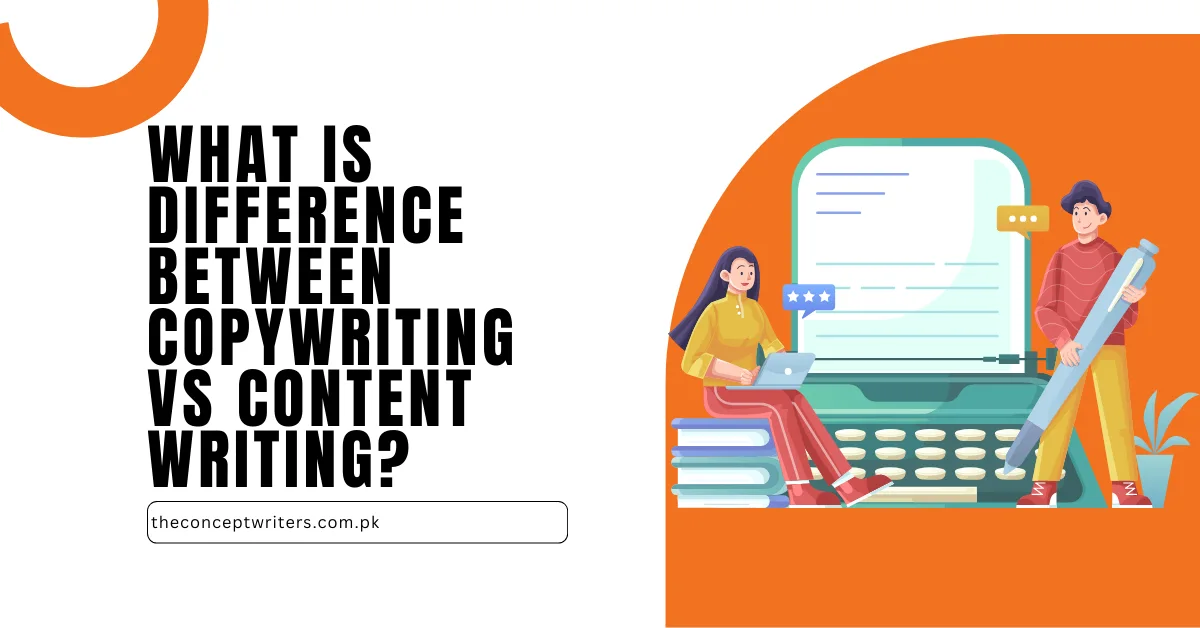What is Difference Between Copywriting vs Content Writing?
Writing is one of the stepping stones for the dawn of civilization; it has been the first proper way to record history. The writing was invented around 7000 to 6000 years ago; during that time, most written material was used for official purposes as many people didn’t know how to read and write.
With time, the ratio of literate populous increased, and many new fronts for writing, like preserving history, stories, poems, other forms of literature, and many other things.
Content writing is a general term given to many forms of writing styles; it is a vast term spanning academics, corporate and marketing sectors. When we draw a comparison between a specific writing style, we consider content writing a stand-alone type with its own rules.
If we do a comparison of Copy Writing Vs Content Writing, which will be better to sell products? In marketing, copy does not mean to copy something; it refers to written information that aims to inform, persuade or entertain an audience.
It has been around since the Babylonian times, but its first printed form appeared in 1477 to promote a prayer book. Today copywriting is a huge part of print and digital media; marketing tactics and promotional strategies all employ heavy copywriting.
Difference Between Copy Writing vs Content Writing
Content writing and copywriting are complementary skill sets for a marketing strategy to be successful. The copywriter’s job is to create effective copy on your website, which converts browsers into customers. Digital ads, billboards, emails, and other media use these words to convey messages.
In contrast, content writers create engaging and informative content. A content writer specializes in writing blogs, ebooks, whitepapers, and other types of content. If we compare copywriting vs content writing what do we learn? Are these two writing styles different? Let’s examine it in more detail.
The difference between copywriting and content writing is that copywriting is a sales tool, and content writing is an educational tool. Even though sales and education don’t necessarily contradict each other, this is a general guideline as to what each form of writing is intended to achieve. As leads move through your sales funnel, copywriting vs content writing perform different functions.
Need your Academic Tasks ASAP?
Need assistance with your Academic Tasks? Help is on the way!
In my opinion, it is as follows:
- If you want to engage your long-term followers, you should write copy that prompts them to act now.
- Building trust in your brand, providing information, and educating your customers can help them make confident decisions
The process of writing content and copy can be affected in a loop. A good example is using your content to drive leads to a sales page (containing copy). You may also encourage leads to read your content before they purchase your copywriting.
Copywriting Drives Sales And Conversions
Marketing copywriting drives sales and conversions for your business. Your sales copy might use a free download or a coupon code to entice leads to join your email list. A link to your product may be more effective if you want someone to buy it.
Your sales copy should evoke emotion and persuade your leads to trust your brand and act accordingly. It can mean the difference between a user visiting your blog, reading ten entries, and moving on…or a user clicking on a link from that blog and opting in or purchasing an item.
When we compare copywriting vs content writing, there are many defined and overlapping features.
- Inform vs persuasion
- Short form vs long form
- Short term vs long term
- Application in SEO
- Driving vs converting organic traffic
- Emotional response
Inform vs persuasion
The purpose of a content writer is to inform, educate, entertain, and instruct a reader. It mostly employs a conversational style of writing to capture the sustained attention of its reader. Content writing persuades and engages a reader to pave the way for eventual purchase, which is necessary to build a loyal customer base. While copywriting is a form of a non-human salesman, it is a short sales pitch in ink on paper or pixels on a screen.
The slogans, one-liners, adverts, etc., are different forms of copywriting.
Short form vs long form
Copy write is used for online and offline adverts, slogans, taglines, etc.; all of these are short-form text. The main goal here is to persuade an audience in the shortest time possible. A matter of urgency is also at play to spark curiosity in the target for them to further investigate the contents of the copy.
Content writing is more about building a gradual interest with the reader’s sustained attention. It is quite different from copywriting in terms of content length and the subject to guide a reader through the context toward the final destination of the content, i.e., selling a product or service.
Short term vs long term
As mentioned above, copywriting plays a role of a salesman, a frontline worker for any company. It has to be effective in the shortest way possible with as little word count as possible. Content writing, on the other hand, works as part of a larger strategy with long-term results. To empty the stock inventory, copywriting needs to sell goods/services as quickly as possible. Content writing will be responsible for all the promotional build-up and information related to those goods/services in the background. It can be said that content writing lays the foundations for copywriting to be effective.
Application in SEO
Basic SEO know-how is required for a copywriting job, while the writer should be an SEO expert for content writing. Nevertheless, the copywriter should have enough skill to generate acceptable amounts of clicks and visits in response.
Content writing does not direct traffic in the short term but shows its true potential in long-term cases. The written content has a longer shelf life, and many have multiple revisits over a long time.
Driving vs converting organic traffic
The content writing drives the traffic towards a goal in a larger strategy, while the copy converts this traffic into sales or leads. In a scenario where SEO content is used to divert traffic towards the company website or a product using articles, blogs, news, etc., the copy SEO will use this momentum generated by SEO content to make sales.
Emotional response
Copy is designed for an emotional response from the reader, and it is immediate and powerful enough to help the end goal of the context. Fear of missing out on the benefits of a product or missing out on something you have been keeping an eye on and now it’s on sale can lead you to make a purchase.
These are not the goals set for content writing, which is why it has a different type of response from the reader like they become more curious or show interest in the article’s subject matter.
Examples of content writing vs copywriting
| Content writing | Copywriting |
| Articles | Ads, online and off |
| Blog posts | Slogans and taglines |
| Newspaper pieces | Web page content |
| Magazine features | Email campaigns |
| Press Releases | Television or radio commercial promotional and advertising scripts |
| White papers | Video scripts |
| Email newsletters | Catalogs |
| E-books | Billboards |
| Books | Postcards |
| Print magazines | Sales letters |
| Podcasts | Direct mail letters |
| Television | Jingle lyrics |
| Film | Social media |
Conclusion
In conclusion, in today’s digitization world, everything depends on written content in one form or another. All the content on a website is a mixture of different styles, each with its specific purpose. Many times, different styles complement and promote or sometimes overlap one another.
Content and copy are examples, and content lays the foundations for a copy to be more effective, while the copy harvests the crop sown by content. Which pays more for copywriting vs content writing?
Recent Posts
Need your Academic Tasks ASAP?
Need assistance with your Academic Tasks? Help is on the way!





